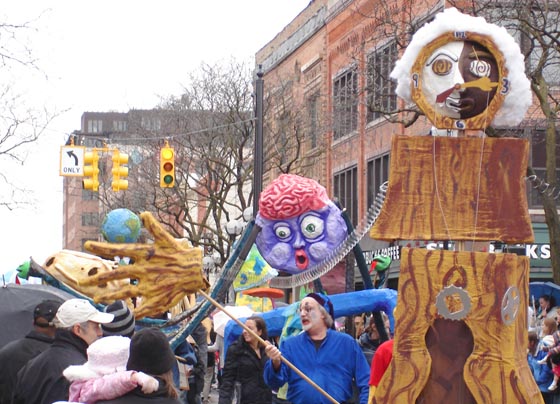As I’ve posted and hinted here many times, NA subsistence practices and theory are a fascinating topic to me.
Here’s a rare link to an NA report on the topic. This has been a subject cloaked in secrecy and contentiousness.
I tend to take a bit of a postmodern anthropology angle about it.
Here’s how the report starts:
The full story of Alaska Native subsistence is politicized and intricate, as other articles in the current Indian Giver relate.
But the ground’s-eye view of subsistence is much simpler, and program interest can begin on that basis, according to Jim Owens, Endangered Ecosystems Program Officer with the four-year-old Brainerd Foundation.[…]
“Just listen and learn. … When you walk into a village home and there’s a haunch of caribou on the table, and that’s dinner, then you understand. And when you talk to the people they’ll tell you what subsistence is.”
The centrality of subsistence resources may be obscured on a first impression by the presence of snowmachines, fishing skiffs with outboard motors, airplanes and other modern accouterments when the newcomer may have expected sled dogs and snowshoes. “Each village has had to come to its own terms with the cash economy,” Owens points out. But these terms are tied to subsistence. In almost every village, imported technologies represent tools for facilitating the subsistence way of life, rather than preempting it. They also ease a multitude of labor-intensive tasks that go with subsistence activities.
I appreciate NA approaches to subsistence but, offhand, it seems that this is the SAME QUEST that most any “lower class” person has. Or, heck, anyone at all. What are they really saying here? Everyone uses tools to support their way of life. And those tools can be “authentic.”
The main thing I noticed in the above is the evidence of potentially shockingly ignorance in the phrase “when the newcomer may have expected sled dogs and snowshoes.” Did the writer possibly mean something like “rich white city person” to go with the term “newcomer”? I’d think that lots of folks, especially lower class, could easily appreciate in a heartbeat any of the supports that a people would have, if at all possible, for getting-by.
To me, the idea of a “Program Officer” is almost more strange than aboriginal subsistence. Add the idea that an ecosystem includes the people within it as PART of it in this case and things get weirder yet. Some people are part of nature while others aren’t, perhaps.
I stopped by a neighbor’s house the other day and when I stepped in he said “Care for some bluegill? How about some venison stew?” He still had both on the stove from the dinner his family just had.
To me subsistence is an interesting aspect that is singled out for one group of people but which represents the interests of EVERYONE.
For instance, one place in the report says that subsistence doesn’t relate to the poverty of a group but to its connection to the wealth of its ancestry. I hear ya!
Now maybe subsistence is indeed in contrast to some practices: I recently met a local taxidermist who stuffs trophies for a fair bit of his living. He mentioned that one hunter’s African Eland license was $23,000. So, trophy folks aren’t hunting for literal subsistence. But, who knows, maybe their expenses are keeping villages alive in Africa. I’ve heard that Panama hats that cost $2,000-$10,000 definitely are bought mostly so that the buyer can be a benefactor for some village in Ecuador. But, of course, this brings up for considering the whole culture behind benefaction and philanthropy: give me power then I give you life. Eh? Like, Gates gives away billions. But he makes even more. Why doesn’t he just charge far less for his products so he never has the excess in the first place? The only answer can be because he wants to be in charge. Of you. (Or anyone. And that is the same as you.) And that is of course, wrong. And evil. Approaching its essence, even. But, no worries, we all get our share in our own way.
Anyway, anthropology is cool because of how it works in all directions. The grad student who goes to study a tribe might be a fascinating creature. Dig into him/her and you’ll find quite a web. The pain might be worth it.
https://www.firstnations.org/publications/ig_subsistence.htm



